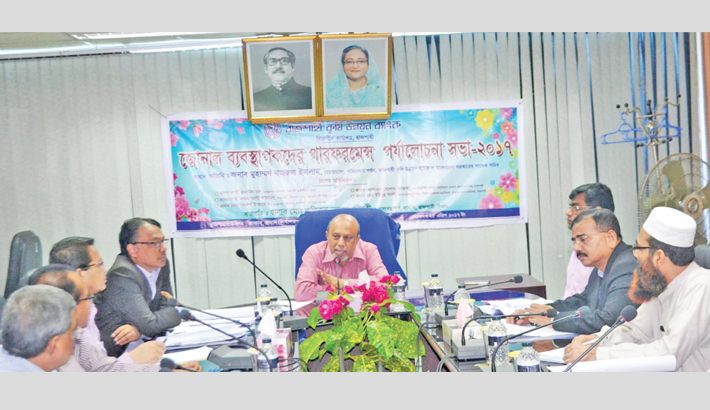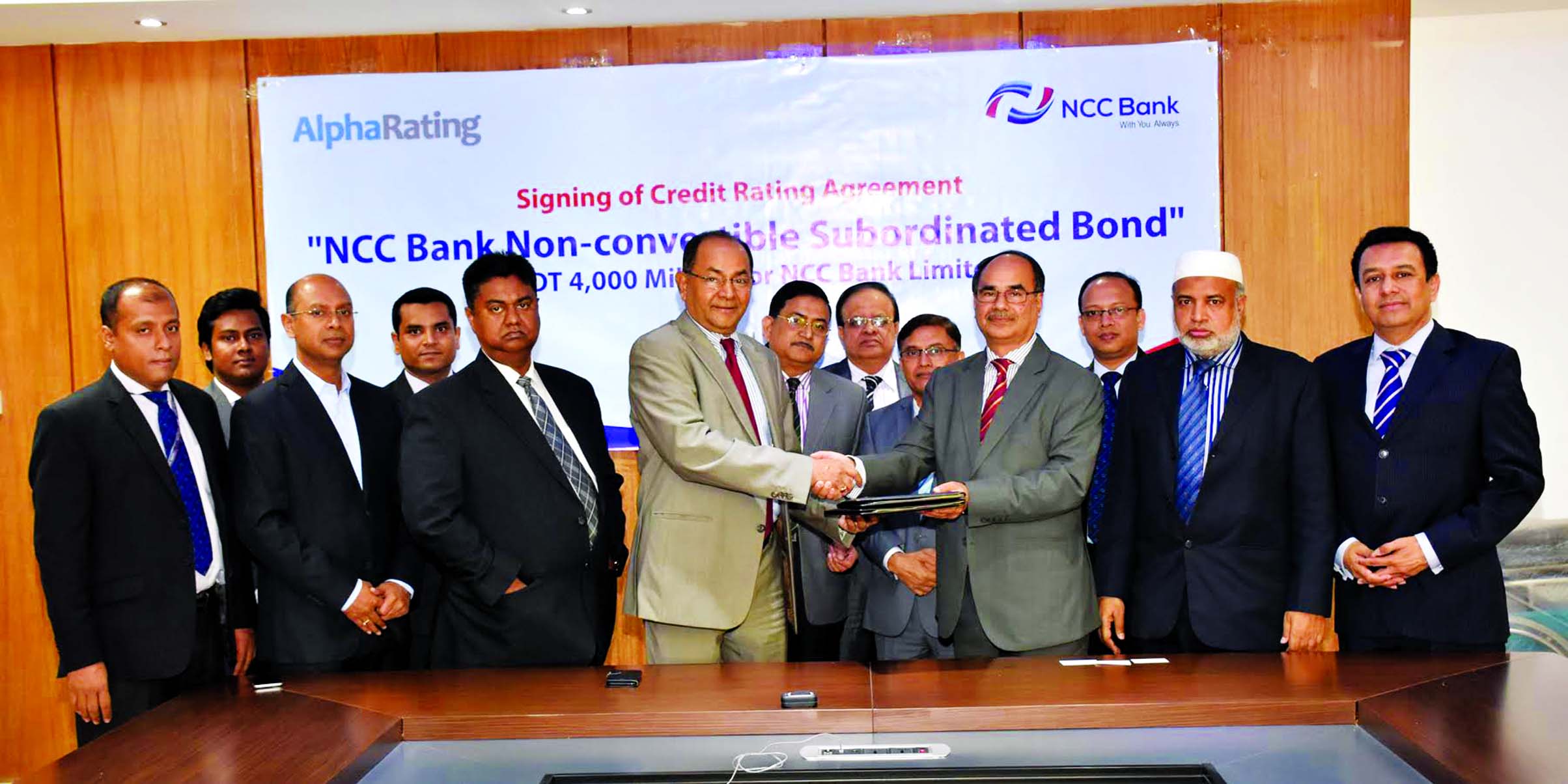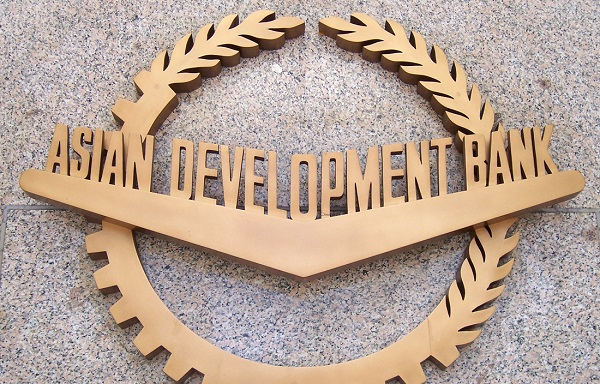RAKUB holds zonal managers’ confce
 Rajshahi Krishi Unnayan Bank Chairman Muhammad Nazrul Islam speaks at the performance evaluation meeting of zonal managers of the bank at its boardroom in Rajshahi on Tuesday.
Rajshahi Krishi Unnayan Bank Chairman Muhammad Nazrul Islam speaks at the performance evaluation meeting of zonal managers of the bank at its boardroom in Rajshahi on Tuesday.
RAJSHAHI” Utmost importance should be given to attaining all business targets of Rajshahi Krishi Unnayan Bank (RAKUB) of the current fiscal so that it can uphold the pace of earning profit.
Aim of the present government is to build a skilled, strengthened and inclusive financial management in the country. Besides, the government is committed to reaching the banking services at the peoples' doorsteps, reports BSS.
The RAKUB management came up with the observations while addressing the performance evaluation meeting of zonal managers at its headquarters here on Tuesday. In addition to all departmental heads of head office, nine zonal managers, divisional audit officers, zonal audit officers, principal of RAKUB Training Institute and project director of SECP were present on the occasion. RAKUB has been operating its banking activities as the largest development partner in all 16 northwest districts of Rajshahi and Rangpur divisions targeting its agricultural sector and all its sub-sectors.
Chief guest Nazrul Islam urged the zonal managers to perform duties with utmost sincerity and honesty to speed up the ongoing farmers-level lending activities.
Golam Hafiz Ahmed, Managing Director of NCC Bank Ltd. and Muhammed Asadullah, Managing Director of AlphaRating exchanging signing documents in the city recently. Mosleh Uddin Ahmed, AMD, Md Habibur Rahman, DMD of the bank and Pranabesh Roy, Chief Strategy
 Golam Hafiz Ahmed, Managing Director of NCC Bank Ltd. and Muhammed Asadullah, Managing Director of AlphaRating exchanging signing documents in the city recently. Mosleh Uddin Ahmed, AMD, Md Habibur Rahman, DMD of the bank and Pranabesh Roy, Chief Strategy
Golam Hafiz Ahmed, Managing Director of NCC Bank Ltd. and Muhammed Asadullah, Managing Director of AlphaRating exchanging signing documents in the city recently. Mosleh Uddin Ahmed, AMD, Md Habibur Rahman, DMD of the bank and Pranabesh Roy, Chief Strategy
BASIC Bank`s ex-DGM sued
The Anti-Corruption Commission (ACC) on Tuesday filed a case against former Deputy General Manager of BASIC Bank Shiper Ahmed on charge of amassing illegal wealth worth Tk 1.40 crore.
Assistant Director of the ACC Muhammad Joynul Abdin filed the case against Shiper Ahmed, also former manager of the bank's Gulshan branch, with Ramna Police Station.
According to the first information report,
Shiper Ahmed, now in jail for being accused in the cases of BASIC Bank loan scam, concealed wealth worth Tk 1.30 crore and the Commission found more illegal wealth about Tk 10 lakh from his wealth statement submitted with the Commission.
The FIR also said Shiper purchase a flat in his name and another one in his wife's name at Bashundhara residential area in the capital, which he mentioned in the wealth statement.
Shiper accumulated the wealth from January 2011 to March 2016, it said.
Earlier, the ACC in September 2015 filed 56 cases against 120 people on charge of swindling nearly Tk 2,590 crore from the bank during 2009-2012.
After filing the cases, the Commission had launched at least 10 separate inquiries over illegal wealth accumulated by some officials of the bank, said ACC officials.
The ACC, however, failed to complete the investigation in 19 months after filing the cases dropping name of the prime suspect former chairman of BASIC Bank Sheikh Abdul Hye Bachchu.
ADB’s annual financing crosses $30b

The volume of the annual operation of the Asian Development Bank’s (ADB) crossed $30 billion mark in the last year.
t is for the first time in ADBs’ 50-year history when the bank’s annual financing reached at such a high level.
Regional demand for development finance and knowledge, particularly on infrastructure, pushed the lending, according to the development bank’s Annual Report 2016 that released today.
It showed that ADB’s total lending in 2016, which includes co-financing, reached $31.70 billion, an 18 per cent increase from 2015.
The total amount includes $17.47 billion in approvals for loans and grants, $169 million for technical assistance and $14.06 billion for co-financing, which increased by a record 31 per cent over 2015.
Disbursements, a key indicator for successful project implementation, also reached a new high of $12.26 billion in 2016.
Private sector operations reached $2.5 billion for the second time in ADB’s history which reflects ADB’s long-term strategy to significantly boost support for private enterprise to create more high quality jobs and increase living standards across Asia and the Pacific.
ADB’s private sector operations also generated a record $5.84 billion in co-financing.
All these figures update the provisional operations numbers released by ADB in January.
Banking sector still well capitalised, despite downgrades - analyst

Cape Town – Most of the local and foreign investors seem to have lowered their expectations for a sovereign credit ratings downgrade as is evident in the rand strength and South Africa’s 10-year bond yields close to 8.2%, said Nkareng Mpobane, fund manager at Ashburton Investments in a company note.
Foreign investors have been buying South African banking stocks on the back of the cheapest valuations relative to emerging-market peers since 2011, despite South Africa’s sovereign credit rating being downgraded to junk by S&P Global Ratings and Fitch following President Jacob Zuma’s Cabinet reshuffle on March 31, which saw the removal of finance minister Pravin Gordhan and his deputy, Mcebisi Jonas.
“Moody’s however has not yet downgraded South Africa and has placed the country on a 90-day review. The ratings agency has South Africa ranked two notches above junk status at Baa2, with a negative outlook.
In the wake of the Cabinet reshuffle and the subsequent downgrades by S&P and Fitch the rand initially lost close to 10% of its value touching the R14/$ level. It has since recovered significantly in the aftermath of the recent turbulence and traded at R13.00/$ at 06:30 on Tuesday.
READ: Banks lose R61bn on Gordhan ouster, downgrade
In the immediate aftermath of the Cabinet reshuffle and ratings downgrade, the six-member bank index declined by over 10%, resulting in a loss of R61bn.
Mpobane, noted that there are short-term, medium-term and long-term risks in the banking sector that investors need to be cognisant of though.
Short-term risks
There could be a readjustment of share prices of banks in the short term. “Higher bond yields mean that when one is calculating the shares a higher discount factor would be used, resulting in a lower valuation.”
Both FirstRand and Standard Bank, he said, are trading at multiples below their three year mean. Prior to the latest pressures, Mpobane said, these shares were deemed to be fairly valued. “Recent price weakness however suggest that they are now attractively priced.”
READ: Stay invested despite downgrades, say analysts
Ashburton doesn’t foresee that any of the banks would need to cut dividends on a two-year outlook, except Barclays Group Africa where its management has indicated there would be a higher dividend cover ratio.
The recent price pressure means that dividend yields in the banking sector now range between 5.5% to 7.5%.
Medium-term risks
On the medium term, the banking sector’s profitability may be affected. “With the latest downgrades we are likely to factor in continued deterioration of the rand, higher inflation and flat interest rates with risks to the upside,” Mpobane said.
In such an environment Ashburton expects diminished economic growth as business confidence wanes, which in turn poses employment risks.
READ: Downgrades, politics could trip up recent economic gains
As far as banks are concerned, Mpobane said he would closely monitor the top-line growth drivers of net interest income and non-interest revenues.
“Impairments would also likely worsen as South Africa moves deeper into sub-investment grade, depending on the inflation rate and the South African Reserve Bank’s response to that.”
Ashburton however expects the banking sector to remain “relatively resilient” from an earnings perspective in the 2017 financial year as higher banking fees would be passed on to consumers.
Long-term risks
Mpobane noted that South Africa’s banks are well capitalised.
The sector averages approximately 13% on the Common Equity Tier 1 (CET1) scorecard, while the minimum regulatory requirement is 10.375% for a particular financial year.
(The Tier 1 common capital ratio shows how well a bank can withstand financial stress and remain solvent.)
Mpobane said the banking sector’s risk-weighted assets will be re-priced following the recent downgrades of South Africa’s banks (on the back of the sovereign credit ratings downgrade).
READ: Can you still bank on SA's banks?
Although banks’ funding is an important aspect of the longer term assessments of the sector, banks have consistently been building up sources of stable funding and liquidity with minimal adverse impacts to their margins.
“We would expect the sector would be able to pass on the higher costs of funding to the consumer, within reason,” Mpobane said.
news:news24.com/25-apr-2017



